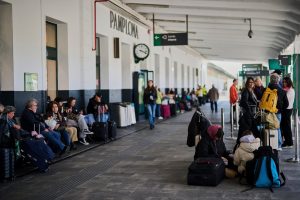
Letters to the editor
Suffering in silence
As we go to our jobs, open doors to our homes without thinking about it, prepare meals, shower with warm water, there’s a group of people who would love to have this. In the shadows of America’s cities, on sidewalks, in shelters, or tucked away in cars parked just out of sight, lives a growing demographic that is too often ignored: the elderly homeless. They are grandparents, parents, aunt’s, uncles, siblings, cousins.
According to data from the National Alliance to End Homelessness, people aged 50 and older now represent nearly half of the single adult homeless population. Many of them are experiencing homelessness for the first time. They are not addicts or mentally ill. These are people who may have suffered some unforeseeable crisis and couldn’t manage to bounce back. Things like the death of a spouse, long medical stays or job loss contributed to their situation.
Aging while homeless accelerates health decline. A 55-year-old on the street has the physical health of someone in their 70s. Due to shelters not having availability and the knowledge of how to care for an aging adult they are left on their own without shelter, access to medication, or nutrition. The chronic medical issues go untreated. Many of them die way before their time due to lack of treatment.
Why is this off the radar? For years, there have been attempts at creating and maintaining affordable housing that have not been successful. Wages have been stagnant although the cost of living has risen making it hard for people to make ends meet. Although many employers have retirement plans now, this wasn’t always available to our elders. Social Security payments, although they try to adjust to the cost of living often fall short of covering rent, especially in high-cost areas. For Black and Latino elders — who face systemic economic disparities — the risk of homelessness is even higher.
How do we help? We need to expand affordable housing options for low-income seniors, including supportive housing services that can aid with providing medical and social services. We need stronger tenant protections, especially for older adults on fixed incomes. Lastly, we need to look at increasing budgets for programs that are specifically tailored to elderly housing. Aging in a comfortable stable environment should be a right, not a privilege.
More broadly, we need to look at what is going on around us and ask ourselves: How do we allow our elders to suffer alone? We were all brought up to respect our elders. This is not respect. We are ignoring their needs and their well-being. The homeless elderly are out there. We must start paying attention. We can advocate for the elderly homeless population by writing letters to our local representatives/councils and attend city council or housing committee meetings. Lastly, we can support legislation that supports funding or tax incentives for senior housing opportunities.
Tonika Hall, BSW, LSW
Pittsfield

